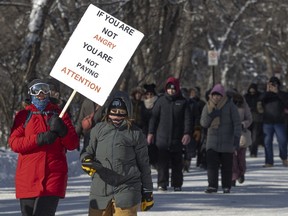While the STF says it’s a major concession — what fatigued teachers want to hear — it’s not yet a clearcut win for teachers, either.

Article content
Someone had to blink first in the standoff between teachers and the Saskatchewan Party government.
The B-52 bombers were being armed. The missiles were pointed. Both Premier Scott Moe’s government and the Saskatchewan Teachers’ Federation (STF) were potentially on a course for mutually assured annihilation.
Well, according to a document provided to the Regina Leader-Post Wednesday morning, the government blinked first by amending its arbitration offer on Saturday night to allow the arbitrator to consider a “class complexity/accountability framework” and teacher wages.
Advertisement 2
Article content
This is not a “both sides” situation. Someone had to blink first, and — notwithstanding the spin you are already hearing — that side was the government.
As recently as his last scrum with reporters, Education Minister Jeremy Cockrill claimed befuddlement as to why the teachers rejected his initial offer for arbitration; he delivered the same unblinking message that classroom complexity and composition would not be part of the contract.
Under the Employment and Education Acts, both sides have to agree to arbitration and agree to what will be arbitrated. The STF in March asked for a binding arbitrator to look at classroom complexity and composition — a request that, incidentally, still does not please every member of the union. (More on that in a moment.)
Of course, after a year of insisting that only the government and school trustees can have input on how money for the classroom should be spent, the Sask. Party government has no interest in leaving the impression that it has now somehow caved in to the teachers.
So its message is that the teachers blinked in this Saskatchewan education version of the Cuban Missile Crisis.
Article content
Advertisement 3
Article content
The untold-for-decades story of the 1962 standoff that brought us to the brink of nuclear war is that Soviet leader Nikita Khrushchev only agreed to John F. Kennedy’s demands to turn Russian boats around if Kennedy would quietly remove U.S. short-range ballistic rockets positioned in Turkey.
Scott Moe is no JFK and Cockrill is no Robert Kennedy. That said, while the STF says the government made a major concession — what fatigued teachers want to hear — it’s not yet a clearcut win for teachers.
The longstanding STF position was that classroom composition and complexity should be dealt with separately from salary issues, with teacher/government collective input.
Some teachers may feel it’s wrong to have this settled by an arbitrator and may be further unhappy that it’s come out as a backroom deal cooked up between the government and school boards.
According to the information obtained by Postmedia, the STF membership attended information sessions on Tuesday night to explore two options: 1) continue withdrawal of services in the hope that the government-trustee bargaining committee (GTBC) will change its mandate, but risk the “possibility of a forced resolution,” or 2) agree to binding arbitration for wages and a class complexity framework.
Advertisement 4
Article content
Should teachers pick the second option as a result of a members’ survey due Friday at noon, the current sanctions would end. To accept this option would allow the STF to heal a divided membership and would cause the Sask. Party to have to deal with this as an election issue.
However, some teachers could be more worried that a conservative-minded arbitrator may decide that the issue is too complex or beyond his scope and suggest the two sides should work this out themselves.
Sure, that would at least be a partial win for teachers, exhausted in this war of nerves. As such, it seems quite likely a lot of teachers will see the second option as the path forward and decide to roll the dice with arbitration.
But other teachers in a now-divided bargaining unit might think that since they’ve already gone this far, there’s no point to gambling on an arbitrator who might not rule in their favour, or rule at all.
The government has blinked, but that doesn’t necessarily mean the teachers have won this stare-down.
Mandryk is the political columnist for the Regina Leader-Post and the Saskatoon StarPhoenix.
Advertisement 5
Article content
Recommended from Editorial
The Regina Leader-Post has created an Afternoon Headlines newsletter that can be delivered daily to your inbox so you are up to date with the most vital news of the day. Click here to subscribe.
With some online platforms blocking access to the journalism upon which you depend, our website is your destination for up-to-the-minute news, so make sure to bookmark leaderpost.com and sign up for our newsletters so we can keep you informed. Click here to subscribe.
Article content





